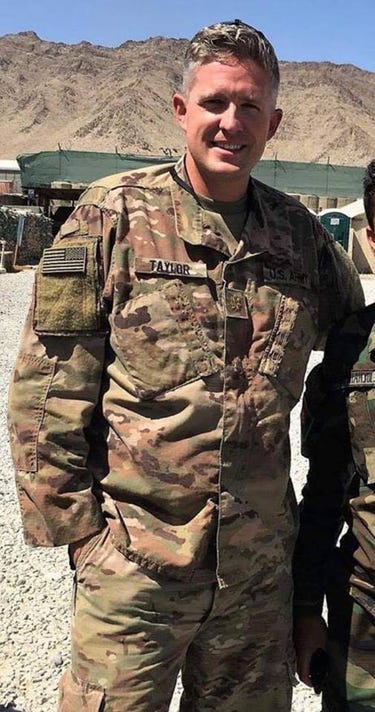Historians of the now seventeen-year old U.S. war in Afghanistan will take note of this past week when the newly-appointed American general in charge of US and NATO operations in the country made a bombshell, historic admission.
He conceded that the United States cannot win in Afghanistan.
Speaking to NBC News last week, Gen. Austin Scott Miller made his first public statements after taking charge of American operations, and shocked with his frank assessment that that
the Afghan war cannot be won militarily and peace will only be achieved through direct engagement and negotiations with the Taliban — the very terror group which US forces sought to defeat when it first invaded in 2001.
"This is not going to be won militarily," Gen. Miller said.
"This is going to a political solution."
Miller explained to
NBC:
My assessment is the Taliban also realizes they cannot win militarily. So if you realize you can't win militarily at some point, fighting is just, people start asking why. So you do not necessarily wait us out, but I think now is the time to start working through the political piece of this conflict.
He gave the interview from the Resolute Support headquarters building in Kabul. "We are more in an offensive mindset and don't wait for the Taliban to come and hit [us]," he said. "So that was an adjustment that we made early on. We needed to because of the amount of casualties that were being absorbed."
Starting
last summer it was revealed that
US State Department officials began meeting with Taliban leaders in Qatar to discuss local and regional ceasefires and an end to the war. It was reported at the time that the request of the Taliban, the US-backed Afghan government was not invited; however, there doesn't appear to have been any significant fruit out of the talks as
the Taliban now controls more territory than ever before in recent years.
Such controversial and shaky negotiations come as in total the United States has spent well
over $840 billion fighting the Taliban insurgency while also paying for relief and reconstruction in a seventeen-year long war that
has become more expensive, in current dollars, than the Marshall Plan, which was the reconstruction effort to rebuild Europe after World War II.
Even the
New York Times recently chronicled the
flat out deception of official Pentagon statements vs. the reality in terms of the massive spending that has gone into the now-approaching two decade long "endless war" which began in the immediate aftermath of
As of September of this year the situation was as bleak as it's ever been after over a decade-and-a-half of America's longest running war, per
the NYT's numbers:
But since 2017, the Taliban have held more Afghan territory than at any time since the American invasion. In just one week last month, the insurgents killed 200 Afghan police officers and soldiers, overrunning two major Afghan bases and the city of Ghazni.
The American military
says the Afghan government effectively “controls or influences” 56 percent of the country. But that assessment relies on
statistical sleight of hand. In many districts,
the Afghan government controls only the district headquarters and military barracks, while the Taliban control the rest.
For this reason Gen. Miller spoke to NBC of
an optimal "political outcome" instead of "winning" — the latter being a term rarely if ever used by Pentagon and officials and congressional leaders over the past years.
Miller
told NBC: "I naturally feel compelled to try to set the conditions for a political outcome. So, pressure from that standpoint, yes. I don't want everyone to think this is forever."
And ending on a bleak note in terms of the "save face" and "cut and run" nature of the U.S. future engagement in Afghanistan, Gen. Miller concluded,
"This is my last assignment as a soldier in Afghanistan. I don't think they'll send me back here in another grade. When I leave this time I'd like to see peace and some level of unity as we go forward."
Interestingly, the top US and NATO commander can now only speak in remotely hopeful terms of "some level of unity"
— perhaps just enough to make a swift exit at least.
The Afghanistan war cannot be won militarily and peace will only be achieved through a political resolution with the Taliban, the newly-appointed American general in charge of US and NATO operations has conceded.
In his first interview since taking command of NATO’s Resolute Support mission in September, Gen. Austin Scott Miller provided NBC News with a surprisingly candid assessment of the seemingly never-ending conflict, which began with the US invasion of Afghanistan in October, 2001.
“This is not going to be won militarily. This is going to a political solution," Miller
said.
He mused that the Taliban is also tired of fighting and may be interested in starting to
“work through the political piece” of the 17-year-old war.
But it’s not clear if the Taliban is open to negotiations. Last month, a top Taliban commander
told RT, in a rare interview, that the group’s leaders had no desire to negotiate with the Americans.
Described for years as a stalemate, the conflict has been tipping in the Taliban’s favor in recent months. Even by US military estimates, the Afghan government controls or influences just over half of the country’s 407 districts – a record low since the Special Inspector General for Afghanistan Reconstruction, or SIGAR, began tracking district control in November 2015.
To make matters worse, casualties among Afghan government forces have skyrocketed in recent months. Afghan security forces suffered 1,000 fatalities in August and September, according to the Pentagon.
READ MORE: US veterans overwhelmingly want troops out of Afghanistan – poll
Miller’s desire for a political settlement was echoed earlier by the State Department, which said in August that the US was doing everything it could to
facilitate peace talks between the Taliban and the Afghan government.
The new US commander has experienced the deteriorating security situation in Afghanistan first-hand. In October, Miller
survived a Taliban attack in Kandahar, which left a prominent Afghan warlord and local intelligence chief dead.
Translated from Persian by
Microsoft
جمهورغنی, Deputy Head of the Ministry of Foreign Affairs, South Asia and Central America to attend accepted-for more information click on the link:
| ریاست جمهوری افغانستان رئیسجمهورغنی، معاون وزارت خارجۀ امریکا در امور آسیای جنوبی و مرکزی را بهحضور پذیرفت …
Hamad Ashraf Ghani Rayjamhuri Islami Afghanistan Imruz Khanem Al-Wa'elis is an assistant and has visited abroad in South Asia and Central Asia.
Dar Dien Dardar Khar Das Qasr Ghalkhanٔ ار Arj Njam Shad, Hrdujanb d. Murad Khajongi Ta'ayerat al-Yalat Mujidah Amerika Balay Bandar Jhabhar, Research and exchange of views of Kurdistan.
The Government of Afghanistan Prior to the arrival of the resource of Bandar Jhabar, along with the Government of Elat, the United States of America, discussed the situation in Haiti, where he was discussed and discussed by the Head of the Public Supporters and visited abroad by the United States of America, provided by Mr. Meredith, Minister of Economic Affairs, . #






